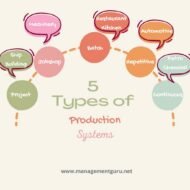Posted by Managementguru in Operations Management
on Feb 24th, 2014 | 0 comments

Production systems can be classified as Job-shop, Batch, Mass and Continuous production systems. Here we will explain about Batch and Jobshop production systems, their benefits and limitations. Batch Production What is batch production? A manufacturing process in which components or goods are produced in groups (batches) and not in a continuous stream. Characteristics: 1. Shorter production runs. 2. Plant and machinery are flexible. 3. Plant and machinery set up is used for the production of item in a batch and change of set up is required for processing the next batch. 4. Manufacturing lead-time and cost are lower as compared to job order production. Benefits 1. Better utilisation of plant and machinery. 2. Promotes functional specialisation. 3. Cost per unit is lower as compared to job order production. 4. Lower investment in plant and machinery. 5. Flexibility to accommodate and process number of products. 6. Job satisfaction exists for operators. Limitations 1. Material handling is complex because of irregular and longer flows. 2. Production planning and control is complex. 3. Work in process inventory is higher compared to continuous production. 4. Higher set up costs due to frequent changes in set up. Job Shop Production What is job-shop production? A job shop is a type of manufacturing process in which small batches of a variety of custom products are made. In the job shop process flow, most of the products produced require a unique set-up and sequencing of process steps. Job shops are usually businesses that perform custom parts manufacturing for other businesses. However, examples of job shops include a wide range of businesses—a machine tool shop, a machining center, a paint shop, a commercial printing shop, and other manufacturers that make custom products in small lot sizes. These businesses deal in customization and relatively small production runs, not volume and standardization. This is a custom made furniture design! Characteristics: 1. High variety of products and low volume. 2. Use of general purpose machines and facilities. 3. Highly skilled operators who can take up each job as a challenge because of uniqueness. 4. Large inventory of materials, tools, parts. 5. Exhaustive planning is essential for sequencing the requirements of each product, capacities for each work centre and order priorities. Benefits 1. Because of general purpose machines and facilities variety of products can be produced. 2. Operators will become more skilled and competent, as each job gives them learning opportunities. 3. Full potential of operators can be utilised. 4. Opportunity exists for Creative methods and innovative ideas. Limitations 1. Higher cost due to frequent set up changes. 2. Higher level of inventory at all levels and hence higher inventory cost. 3. Production planning is complicated. 4. Larger space...


